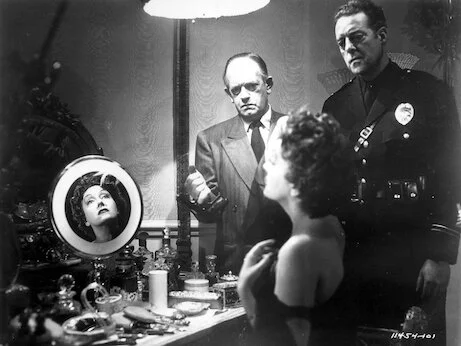The unfortunate prescience of Sunset Boulevard (dir. Billy Wilder, 1950)
Download the Sunset Boulevard screenplay for personal, private use.
Sunset Boulevard commented on the cult of self-obsession in an embryonic stage, when it still had limits; written in the late 1940s, the film scrutinised an early point in the snowballing expanse of self-invention and self-reproduction, when the bounds of script, screenwriter, and studio still loomed large. The film explores the human desire for stardom in an autobiographical narrative, a desire which spills out of control for the story’s aging star, much as it has continued to spill out of control for an increasingly broad swathe of digital society.
Sunset Boulevard foreshadows the death of the screenwriter- both literally, with its opening shot of Joe Gillis floating face-down in the pool he ‘always wanted’, and further, in a way its writer, Billy Wilder, never could have imagined. While the obsessions with the camera and self-image which Wilder and his cast skewer so viciously burn as bright as ever, the self-created narrative which fuels the film’s ghastly conclusion ventures beyond what the first silent movie creators could have imagined. Just as Norma Desmond’s self-created ‘scene’ shreds the boundaries of narrative storytelling- driving her to murder the film’s disembodied narrator Joe, and literally dissolving the screen in the last shot of her infamous closeup- her twin obsessions of personal stardom and the camera, have had an equally destabilising effect in modern life.
Five years after Sunset Boulevard’s release, Theda Bara, the quintessential Hollywood vamp of the silent era, reflected that “to understand those days, you must consider that people believed what they saw on the screen. They thought the stars of the screen were the way they saw them. Now they know it’s all just make-believe”. Sunset Boulevard, a noir about an ageing silent film star who takes a struggling writer into her crumbling palace to edit her comeback script and eventually become her gigolo, rips the gilt from the illusion, creating a horror story revolving around ego, madness, and age, in which a number of cast members play themselves. Gloria Swanson, as Norma Desmond, dines with her real-life contemporaries (fellow silent movie stars including Buster Keaton, scornfully termed ’The Waxworks’); she is spurned by her real-life former director, Cecil B DeMille, and watches an extract of her real-life previous work Queen Kelly, directed by Erich von Stroheim as her on-screen director and butler. With its shots of a real DeMille production, Samson and Delilah, and Paramount lots, Sunset Boulevard not only pulled back the curtain on the movie magic, but shone a bitter light on its stars: exposed as playing the role of the star, always in character for their audience, pretending to be something other than their fading, mortal selves.
This year, Keeping Up With the Kardashians- the symbolic embodiment of shallow Hollywood stardom and what Joe Gillis might term fifty year olds ‘acting like they’re 25’- announced its cancellation after 19 seasons, on the simple but unstated grounds that it had outgrown its cameras. In 2007, the Kardashians needed to keep the cameras trained inward to maintain their relevance, as evident in their family history from the OJ chase to the sex tape which launched the family brand. In 2020, the crews of cameramen and producers who had once corralled them into ‘confessionals’ and along semi-scripted plot lines became redundant; when Covid forced the Kardashians to do their own filming, the switch seemed a natural extension of the stars’ total absorption of the narrative. Production crews, no matter how dedicated, could never outpace the instant streaming of every minute fragment of the family dramas broadcast on Instagram through a front camera.
2020 was a significant year for another reality star who also killed the scriptwriter, so to speak- Donald Trump, whose carefully-constructed role of savvy real estate tycoon veered off the rails into the White House, and just abruptly out of it again. Rather than merely performing for the cameras, Trump embodies the complete unification of the subject and the author, the exhibit and the producer: his Twitter feed of what Norma might scornfully term “words, words, and more words” allowed him to wrest control from the ‘Joe Gillises’ of news networks, campaign managers and scientists, instead composing a script of his own devising. The New York Times compared the recalcitrant Trump, refusing to concede defeat and surrounded by a thinning flock of enablers, to Desmond at her end, when “the dream she had clung to so desperately enfolded her.” In the modern day, everyone with a camera and an internet connection can start to dream their own fantasy showpiece, in the vein of Norma’s Salome, into existence. Wilder’s film plays on the change over two decades in a technology which in 1910 seemed endlessly fresh and benevolent; one hundred years later, social media has taken the place of the silent film, but the song remains the same.
Áine Kim Kennedy is a London-based writer and manager of the ScriptUp blog.





